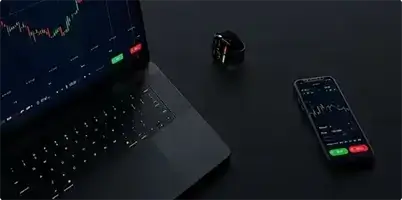
Darren Krett
Monday 19 December 2022
VEGA
0
Comments (0)
Categories
Glossary
Learning
EDGE: The difference between market price and theoretical value-i.e. the long term advantage or disadvantage to the holder of an option position which has been calculated by using an option valuation model.
ENFICIENT MARKET HYPOTHESIS: The EMH view of the markets believes that information is priced instantaneously into stock prices as soon as it is released to the public. The Weak form of EMH suggests that technical analysis adds no value to the markets, the Semi-Strong form of EMH suggests that fundamental analysis cannot provide an edge in investment selection, and the Strong form of EMH suggests that even insiders cannot make an above-average profit from their knowledge since it is alleged to be factored in to the share price. EMH assumes the markets are efficient and thus random in the direction of future prices.
EUROPEAN-STYLE OPTION: An option that may be exercised only on the expiration date.
EXCHANGE TRADED: Traded on an exchange, as opposed to being traded over the counter.
EXERCISE: If the option holder wants to buy (in the case of a call) or sell (in the case of a put) the underlying security at the exercise price or, in the case of a cash-settled option, to receive the cash settlement amount, the option must be exercised. In order to exercise most options,option holders must give their broker exercise instructions meeting the firm's procedures prior tothe firm's exercise cut-off time. Option sellers must be aware of this exercise risk when the option they sold goes deep into the money, and option sellers must make sure they have the capital available to cover any such potential exercise.
EXPECTED VALUE: The mean or average of a random variable.
EXPIRATION CYCLE: A cycle related to the dates on which options on a particular underlying security expire. A stock option, other that LEAPS and long-term options, will be placed in one of three cycles: the January cycle (with options listed in the January, April, July or October cycle months), the February cycle (with options listed in the February, May, August or November cycle months) or the March cycle (with options listed in the March, June, September or December cycle months). At any point in time, an option will have contracts with four expiration dates outstanding: in the nearest two expiration months and in two longer-term cycle months.
EXPIRATION DATE: The last day (in the case of American-style) or the only day (in the case of European-style) on which and option may be exercised. For stock options, this date is third Friday of the expiration month.
EXPOSURE: Sensitivity to a source of risk.
FORECAST VOLATILITY: A guess as to the volatility an underlying price will exhibit in the future.
FORWARD: An agreement to execute a transaction at some time in the future.
FORWARD CONVERSION: Also known as a conversion, it is a quasi-arbitrage neutral spread consisting of long actual underlying and short synthetic underlying against it.
FUTURE: An agreement to execute a transaction at some time in the future.
FUTURES-TYPE SETTLEMENT: A settlement procedure used by commodity exchanges whereby an initial margin deposit is made, but under which no immediate cash payment is made by the buyer to the seller. Cash settlement takes place at the end of each trading day based on the difference between the current day's settlement price and the previous day's settlement price or the original trade price.

Darren Krett
Monday 19 December 2022
0
Comments (0)

Darren Krett
Monday 19 December 2022
0
Comments (0)
Get ahead of the wave and sign up to our socials to get access to exclusive offers, videos, tutorials and latest news.
© 2015 - 2025 Leviathan Financial Management LLC. All Rights Reserved.
Legal Disclaimer: The information provided in the Leviathan website is for informational purposes only. It should not be considered legal or financial advice. You should consult with a financial advisor professional to determine what may be best for your individual needs. Leviathan Financial Management does not make any guarantee or other promise as to any results that may be obtained from using our content. No one should make any investment decision without first consulting his or her own financial advisor and conducting his or her own research and due diligence. To the maximum extent permitted by law, Leviathan Financial Management disclaims any and all liability in the event any information, commentary, analysis, opinions, advice and/or recommendations prove to be inaccurate, incomplete or unreliable, or result in any investment or other losses. Content contained on or made available through the website is not intended to and does not constitute legal advice or investment advice. Your use of the information on the website or materials linked from the Web is at your own risk.